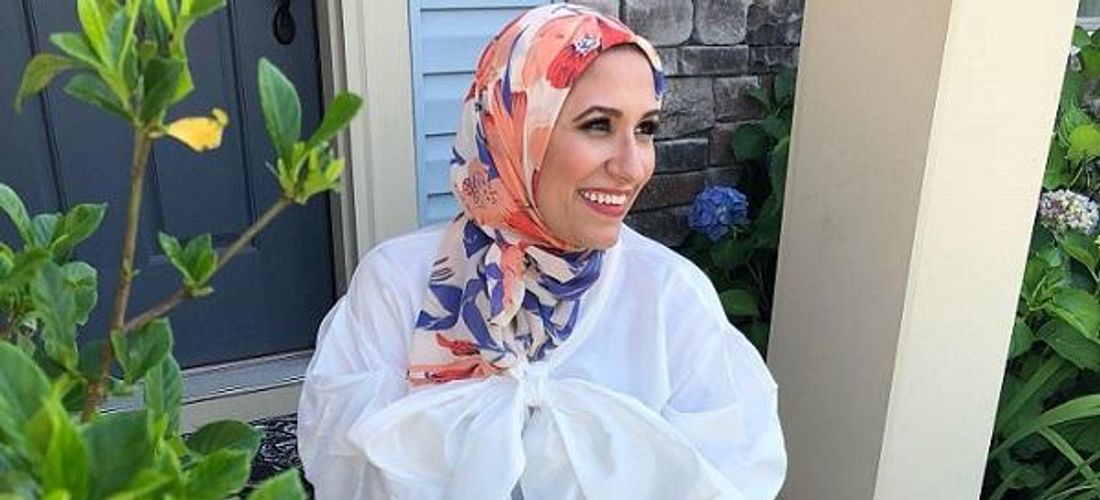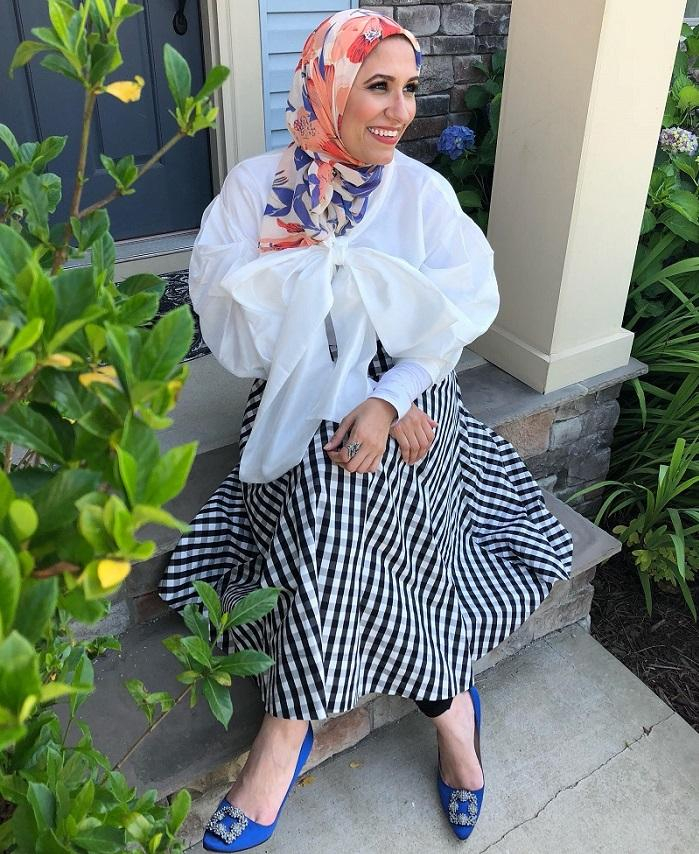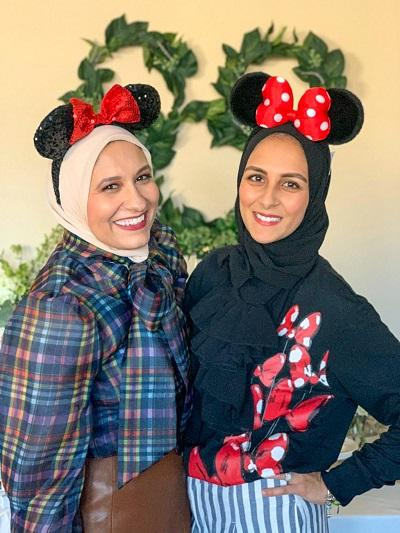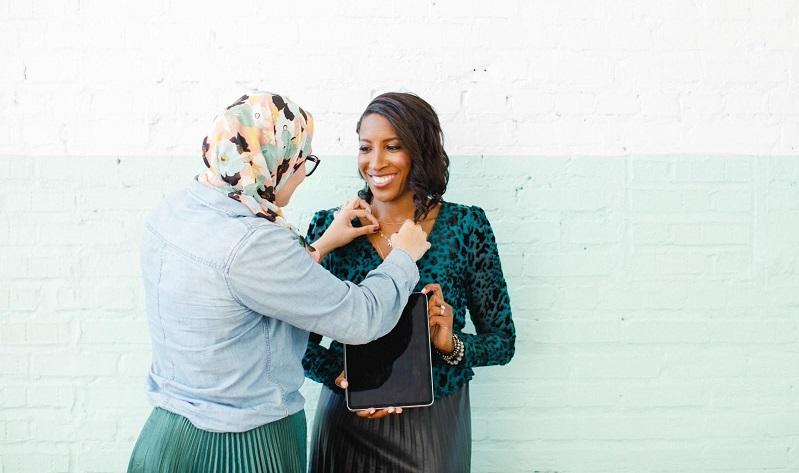As a Fashion Consult in the South, Here's Why I Choose to be Visibly Muslim
Community
|
Dec 16, 2019
|
7 MIN READ

Editor's note: What does it mean to "wear it like you mean it?" We know this coming year may be hard for Muslims, especially visibly Muslim women, and we invite you (and ourselves) to renew our intentions and reflect on what our hijab (and faith) mean to us. Throughout the month we are sharing stories of what this means to women around the U.S. as well as highlighting local heroes who are quietly doing good and hard work in their communities.
By Danah Shuli
It’s no secret that being visibly Muslim in recent years has been an ongoing struggle for many of us. For women who choose to cover, the hijab is our obvious trademark. Each one of us has a different relationship with it. Some of us have been wearing it for as long as we can remember, others may have recently put it on, while some may be going through phases of taking it off. Nonetheless, it is safe to say that wearing hijab, now more than ever, is a big commitment and comes with a hefty responsibility.
As we head into 2020 and reflect this month on what it means to “wear it like you mean it,” I’m interviewing someone who is near and dear to me. She has advocated for proudly wearing hijab since we were young. Lamia Ashour is not only one of my closest friends, but she has also made her way into the fashion world as an independent fashion consultant in the Bible Belt of the South, all the while rocking her hijab in style! Most interestingly, Lamia’s clientele is largely non-Muslim, and she has found that they value dressing modestly as much as she does, which has made her work not only easier but much more meaningful. She uses this common ground to bridge the gap between herself and clients of other faiths.
Lamia has always had an eye for fashion, and you will always spot her in the crowd with her over sized bow collar, high heels and a fabulous bag. One thing that is always constant is her hijab. She loves styling it and is never afraid to try bold prints or shimmery fabrics. Hijab has been woven into her identity, and I couldn’t think of anyone more fitting to sit down and have this conversation with. It’s not an easy choice to stay visibly Muslim; and as we head into 2020, this is why Lamia is choosing to do so.

Fashion consultant Lamia Ashour
You’ve been wearing hijab for as long as I can remember, ever since we were young! When did you first decide to wear the hijab? What sparked your decision? What was your first experience like wearing it in public?
I started wearing hijab in the third grade, I was only seven years old in public school. My sister, who is seven years older than me, had put it on first. So, I think that had something to do with why I decided to try it out. I told my mom that I wanted to try it one day. She asked me “Are you sure?”
I was like, “Yes mama I want to try.” I was so confident about my decision. I went to school with it, and I kept it on.
Alhamdullilah, it was okay, it wasn’t a hard experience in the beginning. At that point there was no stigma yet; this was pre-9/11. I only remember it being a little hard after 9/11 happened. [Once] a kid pulled it off once and others called me names. But, I had an amazing principal and teachers who got him suspended. My school here in North Carolina, was so good with me being Muslim, they were all so supportive.
Even though there weren't that many Muslims in my school, I didn't feel secluded. After elementary school I went to an Islamic school so it was much easier, of course. Having a good support system at home and at school definitely made it easier for me to keep it on.
Your sense of fashion has always made you unique and stand out from the crowd. How does wearing the hijab and being visibly Muslim in the South have an affect on your work as an entrepreneur?
A big part of why I’m so into fashion is actually because I wear hijab. I want to let people know, and let young Muslim girls know, that you can still be fashionable and wear hijab. Growing up in the Bible Belt and wearing hijab at a young age, I saw wearing hijab [pegged to] wearing an all-black abaya. [There was a] specific image as to what hijab meant. I think this was also heavily influenced by our uniform in Islamic school. I wanted to show that I can still have a personality, look fabulous and be modest all while wearing hijab and representing Islam in a way that is proper.
I wanted hijab to be a representation of myself without having to sacrifice anything. It hasn’t been hard just because Alhamdullilah, I have a very strong and confident personality. I think this has also come with wearing it from such a young age. I’ve established that this is who I am, and there’s nothing wrong with that. I believe in people having their own identity. We live in a world of sameness, and I tell my clients that it’s okay to be different. It's okay, to be unique and think outside of the box, and one way to express that is through clothing.
Working in the [South] has been interesting because you get two types of people; those who don’t understand you, [and those] who do understand but do not share the same religious values or beliefs as [you]. Most of my clients are not Muslim and are strongly grounded in their Christian faith. It works in my favor, because they grasp that sense of modesty that I want to keep when I dress them and look for pieces for their wardrobe.

Tell me about your journey in the fashion industry and your role as a fashion consultant.
I started off working in the medical field for about seven years, and realized I was very unhappy and always overdressed for work. I was also sick all the time, had bad migraines [due to my work] and was stressed and unhappy with my job. I sat down and thought about what I wanted to do in life. I was reading a magazine, or maybe I was watching an award show [one of the two], and I remember seeing the words “styled by.” And, I realized – that is what I wanted to do.
So, I got into retail. I was the visual manager at our local Kate Spade and was head of their clientele. I also worked at a local JCrew as their men’s merchandiser and assistant manager. After that I decided to branch out on my own as a freelance wardrobe stylist.
How has wearing the hijab for 21 years shaped who you are today? What drives you to wear it so strongly and proudly in a time when hanging on to our identity as Muslims, let alone a visible symbol, is so challenging?
I could not picture my life without it. It is such a part of who I am, and I identify with it so much that being without it would be, as cliche as it sounds, like being without an arm. Alhamdulillah, I feel blessed to feel that way because I know a lot of people struggle with wearing the hijab or do not have that feeling about it that I do. Like I mentioned before, I think that putting it on so young made it easier for me to still [wear it] today, because we do live in a society [and time] that makes it a bit difficult.
I truly understand why I wear it and have conviction in that reasoning, which is why I hold onto it so dearly, Alhamdullilah. I think that’s what is so important: understanding the why. I know that I have to wear it, and knowing the history behind it and religious reasoning gives me assurance and comfort. My hijab makes me feel strong and confidant.

Lamia styles one of her clients.
We are all on different journeys with our faith and the way we choose to practice Islam. What advice do you have for Muslim women and young girls, who are struggling with their relationship with hijab?
To be honest, I may not necessarily be the right person to give advice, because hijab hasn’t been my struggle. That is not to say I have not had other struggles when it comes to practicing my faith. But if I had to give advice this is what it would be – don’t care so much about what other people think. That’s really what got me through it all these years. I stopped caring about what others thought of me and just did and wore what made me [And Allah (S)] happy.
When you think about why you’re struggling with hijab, what are the reasons? Think about the pros and cons of keeping it on. Do the pros outweigh the cons? In my opinion, one of the pros should be wearing it for the sake of Allah (S). That alone for me, anyway, is the driving factor as to why I have it on. Because at the end of the day, this is an act of worship, and we are doing it for the sake of Allah (S). Just think of your reward for all of the struggles and hardships we go through just by wearing hijab!
[Also], talk to someone about [your struggles]. There are a lot of people who are struggling with hijab, especially in recent times, so you are not alone. It’s okay to have this conversation. You can get advice from others who may be feeling the same way or have gone through the same struggles and have been able to overcome them.
In my opinion, hijab is something that represents who we are as Muslim women and should be a source of pride – it's nothing to be ashamed or scared of. If you find yourself not feeling this way towards it, then I truly believe that you should dig deeper and ask why? Take your time, talk to others and reflect. Wearing hijab is a spiritual journey. Regardless of where we are on that journey, we should hold our head up high and be proud of who we are and what we stand for as Muslims.
Image in the middle is of the author with her best friend, Lamia.
Subscribe to be the first to know about new product releases, styling ideas and more.
What products are you interested in?

